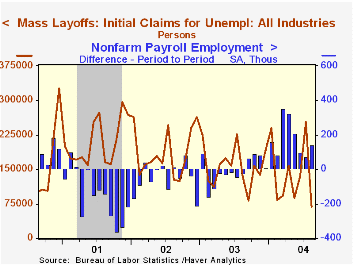 Global| Sep 24 2004
Global| Sep 24 2004Mass Layoffs Plunge
by:Tom Moeller
|in:Economy in Brief
Summary
Mass layoffs in the US as reported to the Bureau of Labor Statistics plunged 61.4% in August to the lowest level since August 2000. The decline, however, followed sharp increases in the prior two months. The number of firms reporting [...]

Mass layoffs in the US as reported to the Bureau of Labor Statistics plunged 61.4% in August to the lowest level since August 2000. The decline, however, followed sharp increases in the prior two months.
The number of firms reporting mass layoffs in August fell to 809 from 2,094 in July.
These layoffs generated 69,033 (-48.4% y/y) initial claims for unemployment insurance, down a sharp 72.8% m/m.
Since the series inception in 1995 there has been a (negative) 45% correlation between the number of initial claims generated by mass layoffs and the one month change in non-farm payrolls.
The Mass Layoff Statistics (MLS) program collects reports on mass layoff actions that result in workers being separated from their jobs. Monthly mass layoff numbers are from establishments which have at least 50 initial claims for unemployment insurance (UI) filed against them during a 5-week period. Extended mass layoff numbers (issued quarterly) are from a subset of such establishments--where private sector non-farm employers indicate that 50 or more workers were separated from their jobs for at least 31 days.
Creative destruction and heightened job uncertainty are explored in this paper from the Federal Reserve Bank of Philadelphia titled "CEOs, Clerks, Computers, and the Rise of Competition in the Late 20th Century."
| Mass Layoffs | Aug | July | Y/Y | 2003 | 2002 | 2001 |
|---|---|---|---|---|---|---|
| Number of Events: All Industries | 809 | 2,094 | -35.7% | 18,963 | 20,277 | 21,467 |
| Numbers of Persons Filing Initial Unemployment Insurance Claim: All Industries | 69,033 | 253,929 | -48.4% | 1,888,926 | 2,245,051 | 2,514,862 |
Tom Moeller
AuthorMore in Author Profile »Prior to joining Haver Analytics in 2000, Mr. Moeller worked as the Economist at Chancellor Capital Management from 1985 to 1999. There, he developed comprehensive economic forecasts and interpreted economic data for equity and fixed income portfolio managers. Also at Chancellor, Mr. Moeller worked as an equity analyst and was responsible for researching and rating companies in the economically sensitive automobile and housing industries for investment in Chancellor’s equity portfolio. Prior to joining Chancellor, Mr. Moeller was an Economist at Citibank from 1979 to 1984. He also analyzed pricing behavior in the metals industry for the Council on Wage and Price Stability in Washington, D.C. In 1999, Mr. Moeller received the award for most accurate forecast from the Forecasters' Club of New York. From 1990 to 1992 he was President of the New York Association for Business Economists. Mr. Moeller earned an M.B.A. in Finance from Fordham University, where he graduated in 1987. He holds a Bachelor of Arts in Economics from George Washington University.
More Economy in Brief
 Global| Feb 05 2026
Global| Feb 05 2026Charts of the Week: Balanced Policy, Resilient Data and AI Narratives
by:Andrew Cates






